Unit3 Electricity 第2课时 语法知识及拓展 课件(共21张PPT)
文档属性
| 名称 | Unit3 Electricity 第2课时 语法知识及拓展 课件(共21张PPT) |
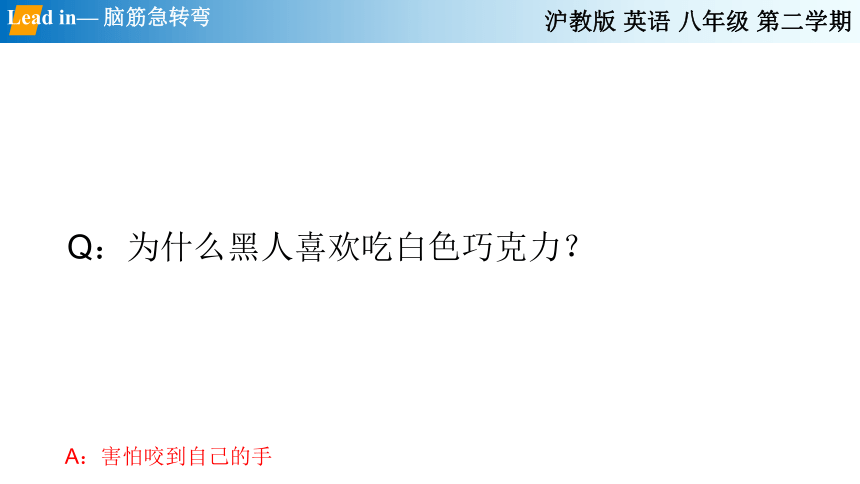
|
|
| 格式 | pptx | ||
| 文件大小 | 459.1KB | ||
| 资源类型 | 试卷 | ||
| 版本资源 | 牛津上海版(试用本) | ||
| 科目 | 英语 | ||
| 更新时间 | 2022-03-09 22:06:41 | ||
图片预览




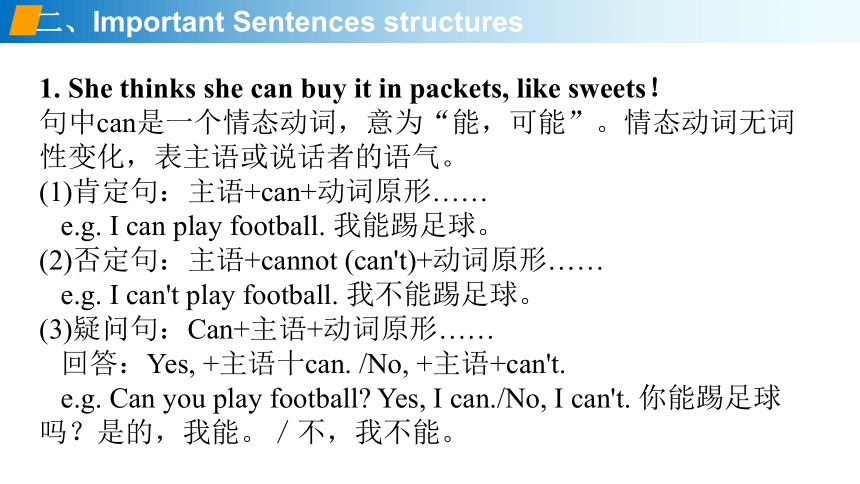
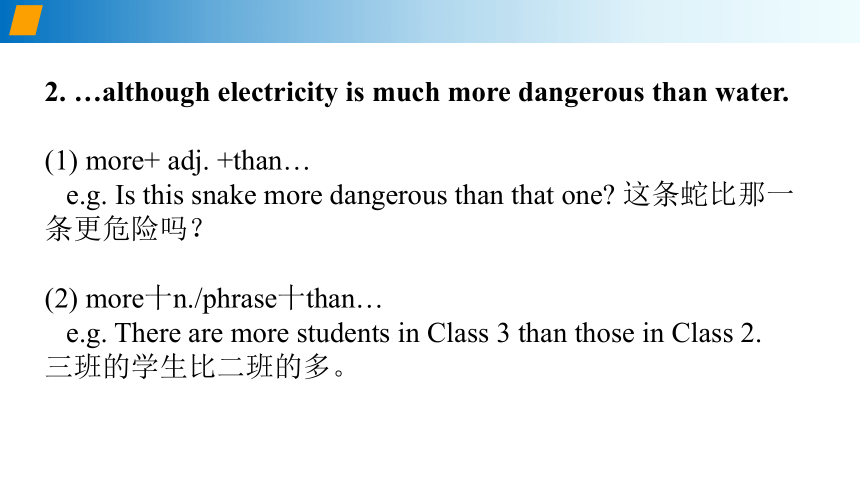
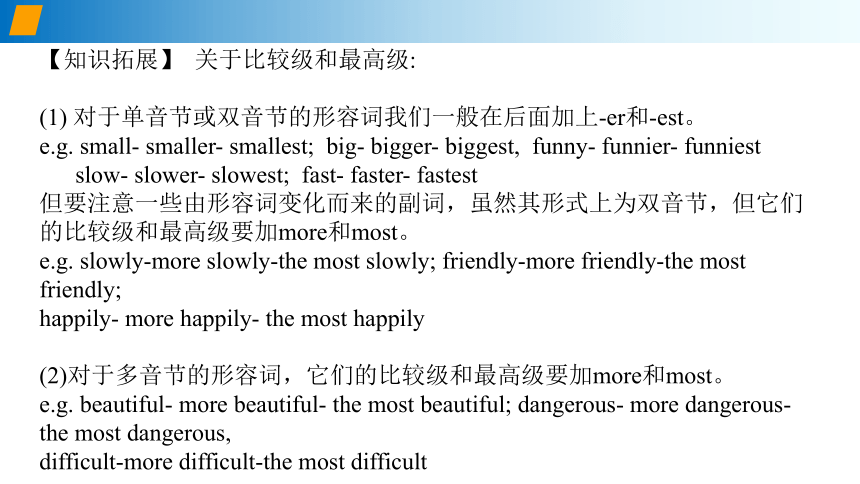
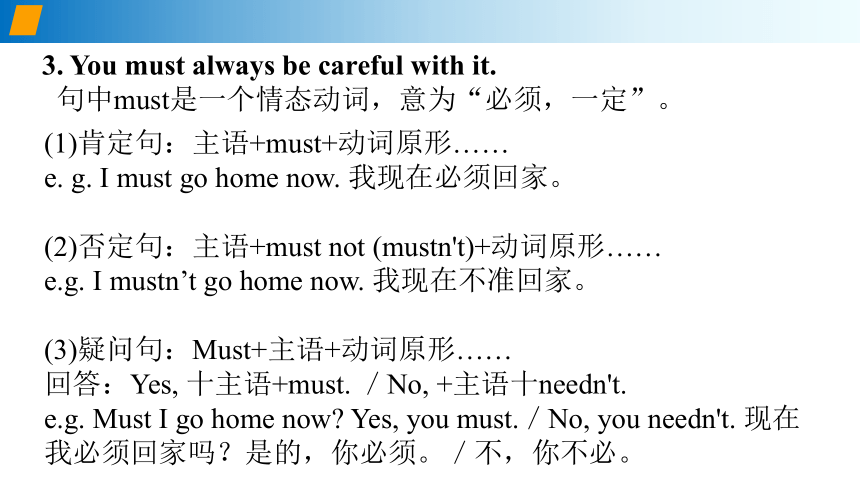
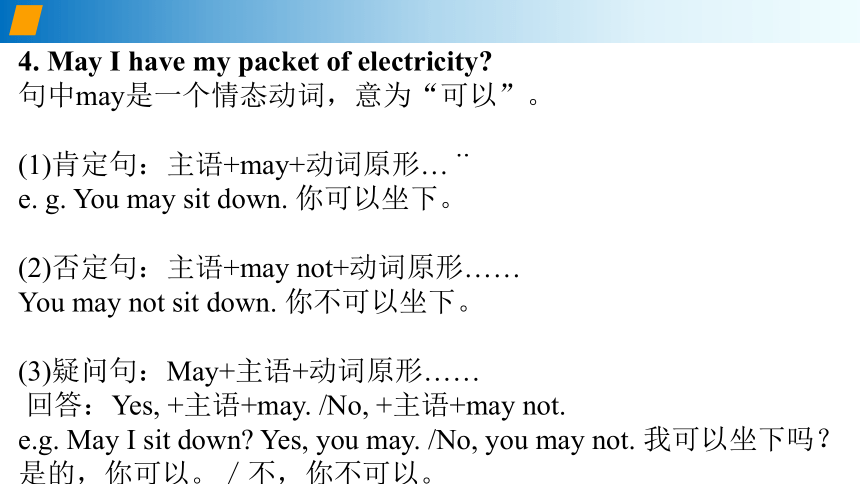
文档简介
(共21张PPT)
Lead in— 脑筋急转弯
Q:为什么黑人喜欢吃白色巧克力?
A:害怕咬到自己的手
沪教版 英语 八年级 第二学期
Snow and Ice Knowledge 冰雪知识
Alpine Skiing
沪教版 英语 八年级 第二学期
一、知识回顾
1. 单词默写。
n. 仆人;佣人
v. 欺骗;坑人
n. 电
adj. 愚蠢的
n. 金属丝,金属线
v. 流动
n. 仪表;计量表
v. 测量;量
n. 账单
adv. 每月一次
n. 解释;解说;说明
adj. 小心的,谨慎的
v. 搔;挠
adj. 看不见的;无形的
n. 形状;形式
n. 能量
n. 电灯泡
v. 连接,联合
v. 埋葬,掩埋
adv. 客气地,斯文地
v. 露齿笑,咧嘴笑
n. 电池
v. 包含,含有
adj. 明白清楚的
n. 熨斗
v. 开或关(电器)
adv. 不连接,不工作
v. (用锁)锁上
二、Important Sentences structures
1. She thinks she can buy it in packets, like sweets!
句中can是一个情态动词,意为“能,可能”。情态动词无词性变化,表主语或说话者的语气。
(1)肯定句:主语+can+动词原形……
e.g. I can play football. 我能踢足球。
(2)否定句:主语+cannot (can't)+动词原形……
e.g. I can't play football. 我不能踢足球。
(3)疑问句:Can+主语+动词原形……
回答:Yes, +主语十can. /No, +主语+can't.
e.g. Can you play football Yes, I can./No, I can't. 你能踢足球吗?是的,我能。/不,我不能。
2. …although electricity is much more dangerous than water.
(1) more+ adj. +than…
e.g. Is this snake more dangerous than that one 这条蛇比那一条更危险吗?
(2) more十n./phrase十than…
e.g. There are more students in Class 3 than those in Class 2. 三班的学生比二班的多。
【知识拓展】 关于比较级和最高级:
(1) 对于单音节或双音节的形容词我们一般在后面加上-er和-est。
e.g. small- smaller- smallest; big- bigger- biggest, funny- funnier- funniest
slow- slower- slowest; fast- faster- fastest
但要注意一些由形容词变化而来的副词,虽然其形式上为双音节,但它们的比较级和最高级要加more和most。
e.g. slowly-more slowly-the most slowly; friendly-more friendly-the most friendly;
happily- more happily- the most happily
(2)对于多音节的形容词,它们的比较级和最高级要加more和most。
e.g. beautiful- more beautiful- the most beautiful; dangerous- more dangerous- the most dangerous,
difficult-more difficult-the most difficult
3. You must always be careful with it.
句中must是一个情态动词,意为“必须,一定”。
(1)肯定句:主语+must+动词原形……
e. g. I must go home now. 我现在必须回家。
(2)否定句:主语+must not (mustn't)+动词原形……
e.g. I mustn’t go home now. 我现在不准回家。
(3)疑问句:Must+主语+动词原形……
回答:Yes, 十主语+must. /No, +主语十needn't.
e.g. Must I go home now Yes, you must./No, you needn't. 现在我必须回家吗?是的,你必须。/不,你不必。
4. May I have my packet of electricity
句中may是一个情态动词,意为“可以”。
(1)肯定句:主语+may+动词原形…¨
e. g. You may sit down. 你可以坐下。
(2)否定句:主语+may not+动词原形……
You may not sit down. 你不可以坐下。
(3)疑问句:May+主语+动词原形……
回答:Yes, +主语+may. /No, +主语+may not.
e.g. May I sit down Yes, you may. /No, you may not. 我可以坐下吗?是的,你可以。/不,你不可以。
Ⅰ. Read and choose the best answer.
( )1. Can you help me to a good idea
A. think of B. think about C. think over D. think in
( )2. Please the length of the desk with a ruler.
A. measure B. cut C. do D. make
( )3. Sorry, I have nothing to tell you because I know about Judy.
A. a little B. a few C. little D. a few
( )4. He's never seen electricity, he
A. has B. hasn't C. is D. isn't
( )5. —Must I go to buy the ticket for my parents now
—No, you .
A. mustn't B. can't C. may not D. needn't
【随堂小练】
【keys】
Ⅰ. 1.A 2.A 3.C 4.A 5.D
三、语法新课讲解
情态动词的基本用法
1. 情态动词can/could的用法
表示“能力;许可;可能性”等。在口语中,can可以代替may表示许可,而may比较正式。could为can的过去式,可以表示语气较委婉,用于否定句中,表示推测,表示“不可能”。
e.g. Many people can use the computer now, but we couldn't ten years ago.
现在许多人能使用电脑,但10年前我们不能。
He can't be at home. 他不可能在家。
2. 情态动词would与should的用法
(1)情态动词would是will的过去式,表示的语气比较缓和、委婉
。
e. g. Would you please pass me the salt
请递给我盐好吗?(表示语气委婉,希望得到对方的肯定回答)
I would like/love to help you. 我愿意帮助你。(表示缓和)
(2)should表示义务,可用于各种句式,通常指将来。
e. g. You should do what your teacher tells you.
你应该照你老师的话办。
He should do some work, but he doesn’t want to.
他应该做些工作,但是他不想做。
用于第一人称疑问句时,表示征询意见。
e. g. Should I open the window 我可以开窗吗?
3. may与might的用法
(1)情态动词may表示“许可”或含有征求对方意见之意。表示“可以”之意时,用may,它的否定形式为may not,表示“不可以;禁止;阻止”等意思时,常用must not/mustn't代替may not。
e. g. You may go home now. 你现在可以回家了。
--May I watch TV after supper, Mum 妈妈,晚饭后我可以看电视吗?
--Yes, you may./No, you mustn't./No, you may not./No, you'd better not.
是的,你可以。/不,你不可以。/不,你不可以。/不,你最好不。
We may have a lot of work to do. 我们可能有许多工作要做。
(2) might表示“可能”时,其语气及可能性比may要小含义更不确定。
e. g. He might be ill. 他也许生病了吧。
My brother might come here soon.
我哥哥也许马上就会来这里。
4. must的用法
must表示“必须;应该”,否定式为must not/mustn't,表示“不应该;不许可;不准;禁止”等。在回答带有must的问句时,否定式常用needn't/need not或don't have to,表示“不必”,而不用must not。
e.g. You mustn’t speak like this. 你不应该这样说话。
--Must I stay here now 我现在必须待在这里吗?
--Yes, you must. /No, you needn't./No, you don't have to. 是,你必须。/不,不必。/不,你不一定要去。
【例1】
Everyone__________ go through the security check(安检)when entering the World Expo Park.
A. can B. may C. must D. ought
【随堂小练】
【答案】 C
【解析】 此题考查情态动词用法。can表示“能,会”,may表示“可能”,must表示“必须;应该”,ought表示
“应该”,由题意可知答案为C。
【例2】
--___________you turn down your radio, please
--Yes, I can.
A. May B. Need C. Must D. Can
【答案】 D
【解析】 本题考查情态动词的用法。用can引导的一般疑问句,其否定回答是“Yes, 主语+can.”故答案为D。
【例3】
-Have you decided where to spend your summer holiday
-Not yet. We___________go to Qingdao.
A. must B. should C. need D. may
【答案】 D
【解析】 本题考查情态动词的用法。must表示“必须”,should表示“应该”,need表示“需要”,may表示“可能”,由题意可知答案为D。
【例4】
--___________I take some photos in the hall
--No, you___________.
A. Can; needn't B. Must; mustn't
C. Could; won't D. May; mustn't
【答案】 D
【解析】 本题考查情态动词用法。表示请求时一般用may或could引导的一般疑问句,用may引导的一般疑问句的否定回答是No, you mustn't. 用could引导的一般疑问句的否定回答是No, you couldn't. 由题意可知答案为D。
愿君皆有所获,皆有所得
Lead in— 脑筋急转弯
Q:为什么黑人喜欢吃白色巧克力?
A:害怕咬到自己的手
沪教版 英语 八年级 第二学期
Snow and Ice Knowledge 冰雪知识
Alpine Skiing
沪教版 英语 八年级 第二学期
一、知识回顾
1. 单词默写。
n. 仆人;佣人
v. 欺骗;坑人
n. 电
adj. 愚蠢的
n. 金属丝,金属线
v. 流动
n. 仪表;计量表
v. 测量;量
n. 账单
adv. 每月一次
n. 解释;解说;说明
adj. 小心的,谨慎的
v. 搔;挠
adj. 看不见的;无形的
n. 形状;形式
n. 能量
n. 电灯泡
v. 连接,联合
v. 埋葬,掩埋
adv. 客气地,斯文地
v. 露齿笑,咧嘴笑
n. 电池
v. 包含,含有
adj. 明白清楚的
n. 熨斗
v. 开或关(电器)
adv. 不连接,不工作
v. (用锁)锁上
二、Important Sentences structures
1. She thinks she can buy it in packets, like sweets!
句中can是一个情态动词,意为“能,可能”。情态动词无词性变化,表主语或说话者的语气。
(1)肯定句:主语+can+动词原形……
e.g. I can play football. 我能踢足球。
(2)否定句:主语+cannot (can't)+动词原形……
e.g. I can't play football. 我不能踢足球。
(3)疑问句:Can+主语+动词原形……
回答:Yes, +主语十can. /No, +主语+can't.
e.g. Can you play football Yes, I can./No, I can't. 你能踢足球吗?是的,我能。/不,我不能。
2. …although electricity is much more dangerous than water.
(1) more+ adj. +than…
e.g. Is this snake more dangerous than that one 这条蛇比那一条更危险吗?
(2) more十n./phrase十than…
e.g. There are more students in Class 3 than those in Class 2. 三班的学生比二班的多。
【知识拓展】 关于比较级和最高级:
(1) 对于单音节或双音节的形容词我们一般在后面加上-er和-est。
e.g. small- smaller- smallest; big- bigger- biggest, funny- funnier- funniest
slow- slower- slowest; fast- faster- fastest
但要注意一些由形容词变化而来的副词,虽然其形式上为双音节,但它们的比较级和最高级要加more和most。
e.g. slowly-more slowly-the most slowly; friendly-more friendly-the most friendly;
happily- more happily- the most happily
(2)对于多音节的形容词,它们的比较级和最高级要加more和most。
e.g. beautiful- more beautiful- the most beautiful; dangerous- more dangerous- the most dangerous,
difficult-more difficult-the most difficult
3. You must always be careful with it.
句中must是一个情态动词,意为“必须,一定”。
(1)肯定句:主语+must+动词原形……
e. g. I must go home now. 我现在必须回家。
(2)否定句:主语+must not (mustn't)+动词原形……
e.g. I mustn’t go home now. 我现在不准回家。
(3)疑问句:Must+主语+动词原形……
回答:Yes, 十主语+must. /No, +主语十needn't.
e.g. Must I go home now Yes, you must./No, you needn't. 现在我必须回家吗?是的,你必须。/不,你不必。
4. May I have my packet of electricity
句中may是一个情态动词,意为“可以”。
(1)肯定句:主语+may+动词原形…¨
e. g. You may sit down. 你可以坐下。
(2)否定句:主语+may not+动词原形……
You may not sit down. 你不可以坐下。
(3)疑问句:May+主语+动词原形……
回答:Yes, +主语+may. /No, +主语+may not.
e.g. May I sit down Yes, you may. /No, you may not. 我可以坐下吗?是的,你可以。/不,你不可以。
Ⅰ. Read and choose the best answer.
( )1. Can you help me to a good idea
A. think of B. think about C. think over D. think in
( )2. Please the length of the desk with a ruler.
A. measure B. cut C. do D. make
( )3. Sorry, I have nothing to tell you because I know about Judy.
A. a little B. a few C. little D. a few
( )4. He's never seen electricity, he
A. has B. hasn't C. is D. isn't
( )5. —Must I go to buy the ticket for my parents now
—No, you .
A. mustn't B. can't C. may not D. needn't
【随堂小练】
【keys】
Ⅰ. 1.A 2.A 3.C 4.A 5.D
三、语法新课讲解
情态动词的基本用法
1. 情态动词can/could的用法
表示“能力;许可;可能性”等。在口语中,can可以代替may表示许可,而may比较正式。could为can的过去式,可以表示语气较委婉,用于否定句中,表示推测,表示“不可能”。
e.g. Many people can use the computer now, but we couldn't ten years ago.
现在许多人能使用电脑,但10年前我们不能。
He can't be at home. 他不可能在家。
2. 情态动词would与should的用法
(1)情态动词would是will的过去式,表示的语气比较缓和、委婉
。
e. g. Would you please pass me the salt
请递给我盐好吗?(表示语气委婉,希望得到对方的肯定回答)
I would like/love to help you. 我愿意帮助你。(表示缓和)
(2)should表示义务,可用于各种句式,通常指将来。
e. g. You should do what your teacher tells you.
你应该照你老师的话办。
He should do some work, but he doesn’t want to.
他应该做些工作,但是他不想做。
用于第一人称疑问句时,表示征询意见。
e. g. Should I open the window 我可以开窗吗?
3. may与might的用法
(1)情态动词may表示“许可”或含有征求对方意见之意。表示“可以”之意时,用may,它的否定形式为may not,表示“不可以;禁止;阻止”等意思时,常用must not/mustn't代替may not。
e. g. You may go home now. 你现在可以回家了。
--May I watch TV after supper, Mum 妈妈,晚饭后我可以看电视吗?
--Yes, you may./No, you mustn't./No, you may not./No, you'd better not.
是的,你可以。/不,你不可以。/不,你不可以。/不,你最好不。
We may have a lot of work to do. 我们可能有许多工作要做。
(2) might表示“可能”时,其语气及可能性比may要小含义更不确定。
e. g. He might be ill. 他也许生病了吧。
My brother might come here soon.
我哥哥也许马上就会来这里。
4. must的用法
must表示“必须;应该”,否定式为must not/mustn't,表示“不应该;不许可;不准;禁止”等。在回答带有must的问句时,否定式常用needn't/need not或don't have to,表示“不必”,而不用must not。
e.g. You mustn’t speak like this. 你不应该这样说话。
--Must I stay here now 我现在必须待在这里吗?
--Yes, you must. /No, you needn't./No, you don't have to. 是,你必须。/不,不必。/不,你不一定要去。
【例1】
Everyone__________ go through the security check(安检)when entering the World Expo Park.
A. can B. may C. must D. ought
【随堂小练】
【答案】 C
【解析】 此题考查情态动词用法。can表示“能,会”,may表示“可能”,must表示“必须;应该”,ought表示
“应该”,由题意可知答案为C。
【例2】
--___________you turn down your radio, please
--Yes, I can.
A. May B. Need C. Must D. Can
【答案】 D
【解析】 本题考查情态动词的用法。用can引导的一般疑问句,其否定回答是“Yes, 主语+can.”故答案为D。
【例3】
-Have you decided where to spend your summer holiday
-Not yet. We___________go to Qingdao.
A. must B. should C. need D. may
【答案】 D
【解析】 本题考查情态动词的用法。must表示“必须”,should表示“应该”,need表示“需要”,may表示“可能”,由题意可知答案为D。
【例4】
--___________I take some photos in the hall
--No, you___________.
A. Can; needn't B. Must; mustn't
C. Could; won't D. May; mustn't
【答案】 D
【解析】 本题考查情态动词用法。表示请求时一般用may或could引导的一般疑问句,用may引导的一般疑问句的否定回答是No, you mustn't. 用could引导的一般疑问句的否定回答是No, you couldn't. 由题意可知答案为D。
愿君皆有所获,皆有所得
